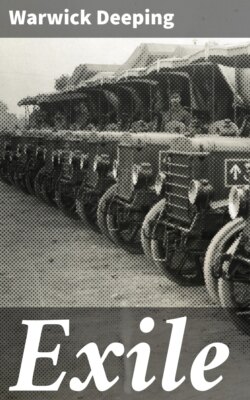Читать книгу Exile - Warwick Deeping - Страница 16
На сайте Литреса книга снята с продажи.
III
ОглавлениеTable of Contents
In Frevick’s ruined face were eyes that could still behold beauty, sunlight on a bird’s plumage, the intense blue of a wind-whipped sea, the flowerlike face of some young girl. Though much of him was blurred and sodden, he retained a streak of that impersonal delight in things, the passion to paint that which was exquisite and clean. He saw and enjoyed, and in seeing and enjoying he possessed, and so was unlike Slade, who could not see an apple on a tree without wanting to climb a wall and make the apple his.
But there were days when beauty hurt Frevick, becoming so personal in its implications, a kind of mirror held before the eyes of his squalid self, that almost he wished the mirror broken. He might sit in the sun, yet the sun would not warm him. His eyes would seem to close up in his grey face. The loose shamble of his long body grew more hopeless. These were the days when he was afraid of his razor, and would appear with grey stubble on his chin, for though he might long for consciousness to cease, he had a kind of childish fear of that other darkness.
On these desperate days he drank.
Slade took charge.
“You are lunching with me, my lad.”
They went down the Corso together, Slade gaillard and head in air, Frevick rather like a doomed beast on his way to the shambles. He wanted to go home and close the shutters, and throw himself on his bed in the half darkness, and forget. The day was too serene, too full of the might-have-beens, too full of the face of youth.
At the corner of the Piazza del Duomo he hung back.
“Think I’ll be getting home.”
Slade held his arm.
“No you won’t. I told Lotta about lunch. Don’t be an ass.”
A vetturino, sitting on the box of his carriage by the fountain, saw Slade’s signal, and roused his drowsing horse.
“Get in.”
Frevick, strangely dumb and docile, climbed in and sat with his feet tucked up, and his eyes looking at the coachman’s back. The fellow cracked his whip, the carriage rolled like a boat in a choppy sea, and Frevick’s figure rolled with it. He looked miserable. Slade, with his hat pushed back, and his stick tapping the toe of a boot, had the face of a mischievous boy.
They turned up the lane by the St. George. The old horse took the hill at a walk, blowing heavily, the driver’s slouching figure swaying gently on the seat. He had two brown patches on the elbows of his black coat, and his fat back was all creases. The zigzag of the lane took them past the Villa Vesta with its white iron gate through which Billy had disappeared five minutes earlier.
Slade glanced at the board on the gate. It amused him, it always amused him.
“The Vestal’s villa! You used to visit there, Thomas.”
Frevick looked vacant.
“Used to.”
“Let’s pause and ask Julia to lunch.”
He tapped Frevick’s left foot with his stick.
“What about it? And the new vestal?”
Frevick was not to be roused even to the blurting of a “Shut up.” He swayed with the lurchings of the carriage. He glanced back over his shoulder.
“O, made that way. Guts. You’re as ignorant as sin about some things, Slade.”
“Sin? Sinning’s knowing—my lad.”
“And forgetting.”
“Yes, something in that too. But good Julia with her cold-bath cult! How naïve and English!”
“Things you don’t understand.”
“Not much.”
“O—well—leave it there.”
The carriage lurched round the next curve, and as the lane levelled itself here along the flank of the hill the driver whipped his horse into a trot. Frevick, swaying from side to side, his hands clasped between his knees, was remembering things which Slade had never known. They sat side by side, as men and strangers, each slightly contemptuous of the other.
Outside the high green gate of the Villa of the Flute, Slade paid the driver, for that poor devil of a Frevick had nothing to fumble for, and did not attempt it.
“Come back at half-past two.”
The Italian understood Slade’s sly and ironic look, for the Signor Frevick was always being put into carriages and carted home, and on this occasion the Signor Slade would pay. He grinned and turned his old horse, and the two men went through the green gate and up between the rows of cypresses to the villa. The sky trailed blue between the tops of the trees, and Frevick, walking up that cleft of shade, pushed his hat back and looked steadily at the sky. He was aware of the strangeness of things, their absurdities, their impersonal oddness. That a man like Slade should pay for a carriage! That they should have driven together! That Slade should own these trees. Why the devil should anybody own them? And why should men eat and drink together? And why was he like a sack stuffed with sour wine and infinite wisdom, carried on two servile legs to the house of this scoffer? How was it that he had never struck Slade in the face?
The impulse had been there.
He found himself in Slade’s cool salon, with a shaft of sunlight putting a hundred fingers on the colours of a Persian rug. A woman was bringing in dishes, a dark woman with sullen, mistrustful eyes. There were flowers on the table, and the heavy scent of them had the sweet sullenness of the woman’s face. And they were as silent.
“Whisky, Thomas?”
“No thanks.”
Slade’s brown face gleamed with humorous eyes and teeth.
“Just as you please. There’s wine.”
“No thanks.”
They sat down.
